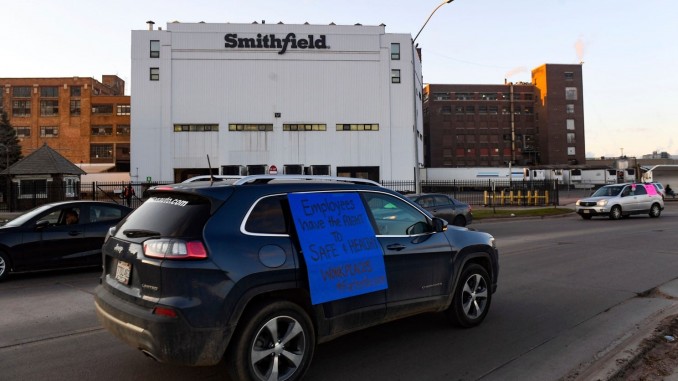
There has been a wave of COVID-19 infections in the meatpacking industry throughout the country. As of April 28, there have been at least 4,400 reported positive cases tied to meatpacking facilities at 80 plants in 26 states, and at least 18 reported worker deaths at 9 plants in 9 states. In Smithfield’s Sioux Falls South Dakota plant, the infection rate has gotten so high that there have been nearly 900 confirmed cases among the workforce.
Things could get much worse very quickly. More than 150 of the largest meatpacking facilities also are located in regions of the country that have the highest infection rates. More than 1 in 3 of the U.S.’s biggest beef, pork and poultry processing plants are in counties that have infection rates 75% greater than average.
In addition, a major source of further potential outbreaks comes from the conditions of the meatpacking plants themselves, which are often run like tyrannical regimes. In the U.S. before COVID-19, meat and poultry workers had some of the highest illness rates of all manufacturing workers. Yet they were also less likely to report injuries and illness than any other type of worker, likely in fear of retaliation. In a number of plants, employees reported that they are not permitted to use the bathroom, even to wash their hands – one of the best ways to reduce the spread of the coronavirus.
So far, attempts by management to provide protective equipment and implement preventative measures have been slow or non-existent. In many cases, the nature of the work on the fast-moving production line makes social distancing of six feet virtually impossible. In other cases, wearing a mask is pointless because of the heavy spraying of water, which soaks the mask and makes it useless.
For the most part, meatpacking plants continue to protect their profits by staying open and operating as usual even if employees have tested positive for COVID-19. However, as of April 29, 28 meatpacking facilities have been shut down after COVID-19 outbreaks. One big reason is that workers are refusing to be lambs led to their slaughter. In the likely event that closures continue, these choke-points in the supply chain will create shortages of meat at supermarkets in the near future.
In response to this, Donald Trump recently used the Defense Production Act (which thus far, he has refused to implement to produce needed hospital equipment), to order the meatpacking plants to reopen. He also expressed his desire to protect the industry from any legal liability from workers getting sick on the job. Plants are being reopened after closures without any testing of workers.
It should be no surprise that the President and these companies have absolutely no concern for the well-being of the workers. But it is absolutely ludicrous to think that a swipe of Trump’s pen will somehow fundamentally change the conditions in these plants that make them so likely to disrupt the supply chains in the first place, whether due to workers getting sick from the virus or due to workers walking off the job, refusing to be sacrificed.
The priorities of this society couldn’t be clearer at this time. The well-being of packinghouse workers, their communities and the general public mean absolutely nothing to those in power when weighed against their desire for profit.
Like the growing number of meatpacking workers all over the country that have walked out of their plants, perhaps it is time that us workers throughout society start to act on our own priorities, starting with a refusal to be lambs led to our slaughter.
Featured image credit: Erin Bormett




